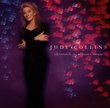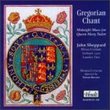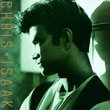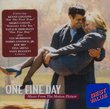| All Artists: Herbie Mann Title: Push Push Members Wishing: 4 Total Copies: 0 Label: Atlantic / Wea Release Date: 10/25/1990 Genres: Jazz, Pop Styles: Smooth Jazz, Soul-Jazz & Boogaloo Number of Discs: 1 SwapaCD Credits: 1 UPCs: 075679030627, 075670053243, 075679030641 |
Search - Herbie Mann :: Push Push
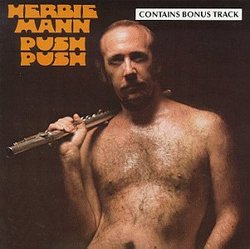 | Herbie Mann Push Push Genres: Jazz, Pop
|
Larger Image |
CD DetailsSynopsis
Album Description Similar CDs
Similarly Requested CDs
|
CD ReviewsPop goes the jazz running_man | Chesterfield Twp., MI | 11/15/2004 (4 out of 5 stars) "This is the only jazz disc currently in my collection, and despite the fact that Herbie Mann is definitely a jazz artist, some would dispute categorizing this as a jazz album. There are no vocals on the tracks, but the presence of Duane Allman, plus the heavy Top 40 song selection, and the fairly straight forward arrangements all tilt the disc more toward pop than jazz. Be forwarned if you're a Duane Allman fan seeking some of his trademark southern blues slide guitar: this is a Herbie Mann recording where the instrumentalists for the most part serve as a soapbox for Mann's flute excursions. Only one song, the title track, give Duane significant room to move. 'Push Push' was released in 1971, directly on the heels of some of the most celebrated songs appearing in the collection. In March and April of that year Marvin Gaye took 'What's Going On' to number two on the national charts, The Jackson Five took 'Never Can Say Goodbye' to number two, and Bread took 'If' to number four. The other charting song is Ray Charles 1959 number six classic, 'What'd I Say'. The disc also offers two Mann compositions, the title track and 'Man's Hope', as well as a bonus track not appearing on the original vinyl, the Grammy winning 'Funky Nassau', which was penned by Bahamian songwriter Dr. Offff Fitzgerald and his cousin, Raphael Munnings. Aretha Franklin rounds out the songwriting, contributing 'Spirit In the Dark'. There is absolutely nothing to complain about in these selections; each is a stunner, with Mann's own work holding up well among the more highly touted commercial successes. The session musicians employed by Mann have references that read like a who's who among the era's most accomplished artists. David Spinoza, whose credits include stints with Paul McCartney and Paul Simon, gives Allman a break, offering a lead guitar solo on 'Man's Hope'. Ralph McDonald, who supports Bernie Purdie and Al Jackson Jr.'s drums with percussion accompaniment has backed David Bowie and Jimmy Buffett. And Donald 'Duck' Dunn, who earned a space in the Rock and Roll Hall of Fame as an MG for Booker T. Jones, has aksi played behind The Blues Brothers and Neil Young. Chuck Rainey also plays bass, and he has performed with Steely Dan and The Eagles. Allman himself has added his talents to recordings by John Hammond, Wilson Pickett, Boz Scaggs, Eric Clapton, and Aretha Franklin. How's that for name dropping? The music itself is an homage to sensuality. The album title and photographs accompanying the disc speak to Mann's desire to create a soundtrack for lovemaking. He succeeds to some degree, but rather than coming off as a celebration of sensuality, the album feels more traditionally romantic, especially the ballads 'If' and 'Never Can Say Goodbye'. The title track and 'Man's Hope' are the funkiest songs on the disc, and seem to produce the most inspired and imaginative response in the performers. I owned the original vinyl version of 'Push Push' while in college, and was also fortunate enough to catch Mann when he made a summer of 1975 appearance at the Pine Knob Music Theatre in Clarkston, Michigan. It was an unusual show as Mann's back-up band, The Family of Mann, got delayed at the airport, and Mann decided to perform the first set solo. I was only sitting a few rows from the stage, and I'll never forget the mesmerizing performance this Mann put on. I was close enough to be able to hear him keeping time by tapping his foot on the stage, and it was all the rhythm accompaniment he needed. He is truly a master of his instrument. While 'Push Push' doesn't, in my opinion, capture Herbie Mann at his best, the song selection and musical stylings probably make it his most accessible work. I'm not sure if the disc is remastered, but since it was released in 1989, I'm doubtful. Scanning the disc and inserts fail to reveal whether it is AAD, ADD or DDD. It does say "reissue produced by Bob Porter", which sounds like a remastering. Go figure. Credits and a few comments by Mann are the only other offerings found in the inserts." COOKS TO A SLOW BOIL Crabby Apple Mick Lee | INDIANAPOLIS, IN USA | 07/02/2006 (5 out of 5 stars) "PUSH PUSH is a landmark of sorts in a number of ways. It came out shortly after the death of Duane Allman who, for all the fame that would follow, was a relatively unknown session player at the time. If other fan sites can be believed, it is fairly certain these sessions took place before the July release of THE ALLMAN BROTHERS AT THE FILLMORE EAST. Even then, it took several months for the live Fillmore album to simmer before most began to realize that the world had a classic rock album in hand. Whether you buy into the Brother Cult or not, no fair listener can ignore the black water and night whiskey grace Allman brings to Mann's search for a deep Southern flavor and root. Moreover, Mann was giving homage once again to the great soul music of the day. As was typical of Mann, he only penned two compositions for this album. One being "Man's Hope" (record executives were fond of making countless puns on Herbie's last name for album titles) and the other being the eponymous "Push Push". It is on "Push Push" that the band actually comes together of one mind. It is the longest cut and in many ways sounds as if it could have gone on for a longer time to fully flesh out the spirit of the moment. "Push Push" is easily worth the purchase of the album. But the album goes on to the Marvin Gaye's transcendent "What's Going On" and Aretha Franklin's mysterious "Spirit In The Dark". After "Man's Hope", the album takes a definite lighter tone. "If" was a rather sentimental and gentle ballad by a band called Bread. It was extremely popular at the time across a wide swath of the young and old and so was considered something of a piece of drivel by those who's tastes run more with the Stones, Santana and Humble Pie. Nevertheless, undoubtedly if you hated it you put yourself in a definite minority and chances are your girlfriend just loved it. No great revelations as Mann does it here; but it is quite nice and pleasant--true to the song's essential spirit, Things pick up with "Never Can Say Goodbye" and "What'd I Say". This is an unusual pairing to say the least. As with "If" and the band Bread, "Never Can Say Goodbye" was made a hit by the Jackson Five--another "kiddie" band you wouldn't allow near your Led Zeppelin records. Still, the song had been done in a cooler fashion by Isaac Hayes just slightly earlier and time has proven the "Never Can Say Goodbye" has legs all its own as a song. Of a more respectable pedigree is "What'd I Say". Most rockers kneel to the ground and raised their arms in honor of the great Ray Charles and this is one of his signature songs. So the pairing of a piece of "fluff" with a holy hymn of soul music was unusual to say the least if not obnoxious. But Herbie Mann was not a musical snob. He just believed in music and let it play--trying to bring out the very best in the nooks and crannies you would suspect were there. As with most Mann albums, if you check your prejudices at the door it all is delightful and makes sense. "Funky Nassau" is added as a bonus track to the CD edition typically because it came out of these same sessions. "Funky Nassau" had been available before in compilation albums and so is not a "gift" in the sense of something new. In an event, much like "Push Push", that cooks up to a slow boil with satisfying results. This album stands on its music all by itself and deserves a higher reputation than it currently has. Its problem is twofold. The first being it is very much an artifact of its time. In 1971 the new openness toward sexually and the "New Morality" was just hitting full steam. The "New Morality" mostly consisted of unfettered carnal intercourse between men and women. The distinction between a gentleman and a horndog was blurred. The difference between a nice girl and a [insert your own gutter language here] became ill-defined and seemed to follow some sort of sliding scale. The "New Morality" celebrated the wonders of the joy of sex which did not necessarily have a permanent commitment involved--sex with no commitment at all to be stone honest--all courteously of THE PILL. (It would be a good ten years before AIDS would rear its ugly head.) Thus the overt suggestiveness of the title PUSH PUSH. In case you didn't get it the first time, on the inner sleeve of the album was a definite but spare drawing of a couple copulating. There on the cover of the album for all to see was a bare-chested Mann hefting his flute--well...I suppose you don't have to subscribe to Freud to get THAT. It caused quite a stir at the time--somewhat like Clark Gable saying "Damn" in GONE WITH THE WIND--But nowadays we regard it as quite tame and dismissing the music all with the same hand. Not fair and not right. Along with its notoriety, Playboy magazine embraced this Herbie (Hugh Hefner) Mann like a long lost child and pushed the album as the hip among hip. Thus we have something of the "Playboy Curse". Jazz fans who mainline their Coltrane and Davis directly into their veins quickly pronounced that anything so popular and championed by such a phoney sophisticated periodical cannot be worthy of serious attention much less admiration. And, of course, there is nothing so "un-hip" and last year's "hip". Thus to the outer darkness Herbie Mann went. Years later, when Mann was sick unto death, only then was it recognized what a generous and genuine musician he was. Still, after all these years, a little condensation hangs around this album like newly poured asphalt on a city street on the bottom of your shoe. This may not rank as Mann's best album; but it is certainly is one of the most pleasing and entertaining. " What a duet! Cory D. Slipman | Rockville Centre, N.Y. | 11/22/2001 (5 out of 5 stars) "This CD presents the unlikely, yet incredible collaboration of Herbie Mann and the late Duane Allman. Mann is his usual solid self on flute but Allman demonstrates a side to his musical talent not exhibited in the Allman Brothers Band. They play off of each other is splendid fashion in recreating finely crafted versions of popular tunes (Marvin Gaye's "What's Going On" being an example). This largely unknown album has been a welcome member of my collection for many years. Tragically, a brilliant musical talent like Duane Allman lost his life soon after the album was released."
|

 Track Listings (8) - Disc #1
Track Listings (8) - Disc #1